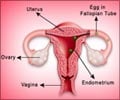If a pregnant woman has a very minor kidney problem, she is more likely to expose herself and the baby to several medical issues.

The researchers found that the risk for adverse pregnancy outcomes-such as preterm delivery, the need for neonatal intensive care, or the development of hypertension in the mother-increased across CKD stages. However, the risk was not merely linked to reduced kidney function because stage 1 CKD patients and healthy controls differed significantly, despite the fact that patients with stage 1 CKD are asymptomatic and have kidney function within the normal range. The team also found that the risks of intrauterine death or fetal malformations did not differ between patients and healthy controls.
"The findings indicate that any kidney disease-even the least severe, such as a kidney scar form a previous episode of kidney infection, with normal kidney function-has to be regarded as relevant in pregnancy, and all patients should undergo a particularly careful follow-up," said Dr. Piccoli. "Conversely, we also found that a good outcome was possible in patients with advanced CKD, who are often discouraged to pursue pregnancy," she added.
The investigators hope that the new findings may help establish dedicated programs for the early diagnosis and follow up of pregnancy in CKD. "We are presently working on a model for grading the risks that will provide patients and physicians with information when making choices about undergoing and monitoring pregnancies," said Dr. Piccoli.
Source-Medindia
 MEDINDIA
MEDINDIA




 Email
Email










